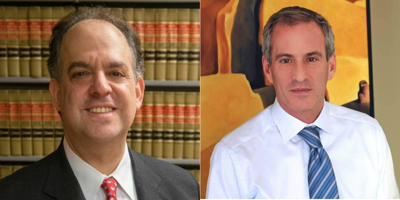
From left: Attorneys Ted Frank and Steve Berman
A federal appeals court has sliced off a bit more of the amount that will be paid to lawyers who helped lead part of the sprawling class action over alleged chicken price fixing, but those lawyers will still be able to walk away with $47 million.
On July 2, a three-judge panel of the U.S. Seventh Circuit Court of Appeals largely overruled objectors' complaints that the lawyers were still getting paid too much under a settlement deal.
The decision marked the second time the appeals judges had handled the case.
In August 2023, the same three Seventh Circuit judges had tossed out a lower court judge's decision awarding $57 million in fees to a group of lawyers including attorneys from the firms of Hagens Berman Sobol Shapiro, of Berkeley, California, and Brent W. Johnson, of the firm of Cohen Milstein Sellers & Toll, of Washington, D.C.
The case had landed before them after an objector identified as John Andren asserted U.S. District Judge John Durkin had improperly allowed the lawyers to claim 33% of a $181 million settlement.
That settlement had concluded one phase of a multi-pronged legal action against chicken producers. Lawsuits filed across the U.S. accused those chicken producers of allegedly violating antitrust laws by allegedly conspiring to keep chicken prices artificially high.
The cases were consolidated in Chicago federal court into two primary actions, one on behalf of so-called "end users," including consumers, and the other on behalf of so-called "direct purchasers," including wholesalers, supermarkets and other retailers.
The lawyers in the action before the Seventh Circuit had represented chicken consumers and other "end users."
After the case settled, the class action lawyers had asked the court to award them more than $60 million in fees, plus $8.75 million to reimburse their costs in bringing the case.
Andren appealed that award to the Seventh Circuit. Before Durkin, Andren had called the attorneys' fee request "exorbitant" and "substantially above-market," and demanded that "there must be consequences" for such "selfish conduct.”
At the Seventh Circuit in 2023, the judges said they believed Durkin had abused his judicial discretion and had ignored key data points in calculating the initial 33% fee award. They particularly noted the judge had "discounted" much lower fee awards the lawyers had accepted elsewhere, including so-called fee "auction bids" the firms had entered at a significantly lower rate in other actions.
The judges at the time ordered Durkin to try again at calculating the fees in the case.
In Chicago federal district court, Durkin assembled what the appeals judges noted was a thorough "detailed fee calculation," which the court noted included "spreadsheet and all."
After reconsidering, Durkin said he believed the plaintiffs' lawyers should receive 30% of the settlement funds, or about $51 million.
Andren, however, said that figure was still too high, and again appealed. He asserted the award should be no more than 26.6%, in keeping with the result of another complex antitrust case, in which the lawyers were awarded that percentage.
In the decision, the appeals judges said they believed Durkin had slightly miscalculated by keeping in play certain contested data points that the appeals judges agreed he should have ignored, resulting in a slightly inflated fee award.
But the appeals judges rejected calls for any drastic reductions, saying to demand any further cuts would "'demand a second major litigation' over fees." The appeals panel reduced the fee award to 26.6% of the settlement, or $47.2 million.
While the case had settled before Durkin had ever established a plaintiffs' class, the appeals judges said the settlement still represented a good outcome for plaintiffs that was the result of a substantial amount of work to this point.
The decision was authored by Seventh Circuit Judge Michael B. Brennan. Judges Diane S. Sykes and Doris L. Pryor concurred in the ruling.
"... Although the case settled before a ruling on class certification, class counsel fully briefed the certification issue," Brennan wrote. "This was not a case where 'no real litigation' occurred; counsel put forth significant effort, which the district court properly considered."
Andren was represented by attorneys Theodore "Ted" Frank and Frank Bednarz, of the Hamilton Lincoln Institute Center for Class Action Fairness, renowned as among the most successful in America at contesting allegedly unfair and excessive fee awards under class action settlements.




